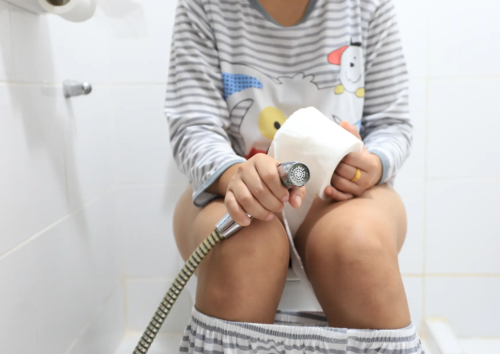Muslims do not use tissue paper when they visit the washrooms; this is one of the many rules emphasized in the Holy Quran. Islam places a big emphasis on hygiene. According to Mohammad’s teachings, keeping yourself clean is integral to the Muslim faith. After visiting the bathroom, people must thoroughly clean their bums with soap and water.
Personal hygiene requirements are mentioned in a single al-Quranic verse that talks about a ritual that purifies Muslims from the minor sources of impurity that they often get from their daily lives, referred to as the Wudu verse. These requirements are very different according to different legal sects and schools of Islam. Many ahadith discuss aspects of personal hygiene related to each other, which differ according to each religion.
The Silent Rule When in The Toilet
When you are in the toilet, you must remain silent. Talking of trying to start a conversation or congratulate someone is discouraged. While two men are in the toilet doing their business, it is forbidden for them to talk or look at each other’s private parts. Eating food or a snack while sitting in the bathroom is also forbidden.
The Portable Lota
There are lots of tiny toilets that you can fit in your pocket or your handbag. They look like empty plastic Capris that you can easily roll up and put in your pocket. If you want an enhanced and more prolonged access to a water stream, you can buy plastic bottles with nozzles that you can split into two pieces and easily dismantle when needed.
Some of these bottles have tiny holes that let you squeeze for easy access. But if you don’t pay attention, you’ll be left with a water trail from the sink to the commode, like a shitty Gretel and Hansel.

How To Use A Lota
It depends on the kind of lota you use, but the primary trick is getting a concentrated stream of water that reaches the area that needs to be cleaned. If you want a quick tutorial on how to use a portable bidet. See the video below:
It all comes down to getting the right angle! You squat down on the bottom of a pot to put some soap in it, then spray some water on it to make it look clean.
Then you run your hand over the pot to get more water. In traditional Islam, the lota is used only with the left hand. Meanwhile, the right hand is for eating.
The Lota Vs. the Shattaf
So, what’s the most significant difference between a lota and a shattaf? How can you differentiate the two? It’s simple!
Usually, if you want more spray, you’ll need to move from one bottle to another. The Shattaf looks more like a shower; it’s a simple device you install in your bathroom.
It works like a hand-held bidet and is so common in Muslim countries that people often refer to it as a Muslim bidet. Shattaf utilizes water to clean your but, just like a lota. Plus, the shattaf is less likely to lack water supply; you can use it for several years.
However, one drawback of a shattaf is that t’s difficult to assemble or uninstall.
Water Vs. Tissue to Wipe Your Bum
Are you still wondering why Muslims prefer using water over tissue paper? Don’t worry; you are in the right place. Here are some reasons why Muslims mostly use water to wash their bum.
1. Skin Care
Apart from water being a better cleansing agent, researchers also claim that wiping out your bum with tissue paper can cause injuries.
It’s because the skin on your bum is very delicate and extremely thin. Dry toilet paper is also very hard sometimes and can be very irritating. That’s why wiping several times or doing the wipe harshly can cause very painful tears (and even bleeding) and/or wounds.
Scientists suggest that a bidet toilet can wash your bum more comfortably and conveniently than toilet paper, particularly for people who have just had surgery or are experiencing irritable bowel syndrome.
2. Water Is Eco-Friendly
If you use only tissue paper to clean yourself at home, it implies that you’ll be consuming a lot of tissue paper. Americans use an average of 3 rolls of toilet paper a week! Thus, on average, the whole country uses about 36.5 billion toilet paper rolls each year!
But did you know how much water is consumed to make one roll of toilet paper? Well, it takes about 140 liters of water to produce one tissue paper roll. Making tissue paper includes pulping, consuming millions of chlorine tones and trees. And that’s not all that happens.
We haven’t even thought about the amount of energy in terms of electricity used in the process of making tissue paper or the other raw materials utilized in packaging the paper and transporting it to retailers.
Research indicates that the waste paper used to make tissue paper will cause the environment to be severely damaged. Still, it is also very annoying to the cities because it causes water and sewer treatment plants to struggle much harder in doing their job.
FAQs
What countries don’t use tissue paper?
Spain, Venezuela, Argentina, Japan, Italy, Portugal, and France don’t generally use toilet paper. Rather than using a toilet, citizens of these nations prefer to use bidet toilets in their bathrooms.
Water vs. toilet paper, what’s more hygienic?
When you compare some critical facts, water wins. Water washes off any poop particle that might remain on your skin, unlike tissue paper. More so, water eliminates the poopy smell that might linger after using the tissue paper. Even though you scrub with toilet paper many times, some residual smell might always remain.
Wash vs. wipe; what’s better after pooping?
Wiping and using water to wash hands thoroughly after pooping is the best way to prevent any spread of pathogenic bacteria. People who go for long calls and forget to wash their hands after wiping out their bum are at risk of spreading pathogenic bacteria.
Wrap UP
If you walk in mosques or most Muslim houses, you’ll always find tissue paper in the toilet. In addition, you’ll find soap which they use diligently to wash their bums. However, it’s healthier to wash your bum after wiping it out using tissue paper.

Amos Christen graduated with a bachelor’s degree in Interior Design from Drexel University — Philadelphia, PA. Since 2003, Amos has worked with top interior design professionals in this area, including architects and interior/graphic/lighting designers. As a skilled interior designer, Amos Christen is highly versed in fine arts and crafts and uses that to supplement his main area of expertise. He often publishes articles related to home décor on several websites, including Sprucetoilets.com, Sprucebathroom.com, and Mybesuitedhome.com. He also contributes to leading interior design magazines.
